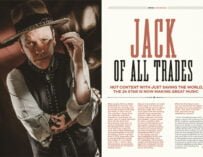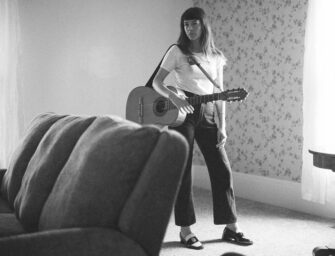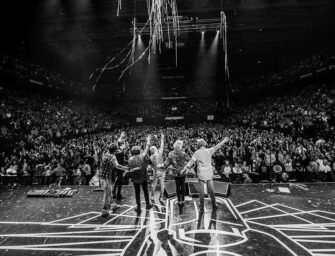
Brian Protheroe: “Songs generally emerge from creative doodling.”
With new album ‘Desert Road’ out now, the ‘Pinball’ wizard provides us with a quick insight into his writing process
As both a musician and actor, Brian Protheroe has walked the walk since the 1960s. On stage and screen (both small and large) his acting work has included the recurring role of Edward IV in several BBC Television Shakespeare productions and that of Saruman in the stage musical of Lord Of The Rings. Credits in television shows such as Lovejoy, Holby City, Midsomer Murders and Doctors have established him a familiar face for several decades.
Of course, it’s his life as a songwriter and musician that’s of most interest to us and it’s one that began in the mid-60s with the group Folk Blues Incorporated (FBI). His solo career kicked off with the album Pinball, released in 1974, and remains a great example of the slightly wonky pop music that he does so well and continued to create on albums such as Pick Up and I/You.
On new album Desert Road, Protheroe has collected together a number of songs co-written with fellow actor and multi-instrumentalist Julian Littman together with a selection of demos and live tracks – including the earliest known recording of his classic single Pinball. These tracks combine to paint a picture of a songwriter and artist equally comfortable at using both wisdom and humour to convey his message whose music remains a thoroughly enjoyable listen. The record’s release gave us the chance to put his songwriting under the spotlight…
How did your working relationship with Julian come about?
“We met in 1981 on a Play For Today [a BBC anthology drama series] called Bavarian Night about a school that hires a band to play at an end of term entertainment event. I was the singer/bassist and Julian was the guitarist. We were also in a musical together in the 80s called Pump Boys And Dinettes. Six months in the West End and two tours really cemented the relationship.”
Why do you think that relationship has endured and been so successful from a songwriting perspective?
“Friendship and the fact that he’s a brilliant musician, multi-instrumentalist and producer. He’s also patient and meticulous in the recording process. Something I’m not.”
Do you have a set process when it comes to writing songs?
“No. Songs generally emerge from creative doodling – musically and lyrically on guitar or piano. A particular chord sequence or musical feel, a word or phrase that might suggest or evoke a gradual stream of connected ideas. I suppose the source of many of my songs is, of course, personal relationships as with many songwriters down the ages. However, with many that’s not the case, especially songs written with lyricist Martin Duncan many of which have a theatrical/surreal feel.”
What part of songwriting do you find most fulfilling?
“Suddenly being struck by the perfect phrase or word is pretty good! Also finally finishing a song that’s been a struggle to complete. The cherry on the cake is finally hearing the final recording after it’s been mastered.”

Brian Protheroe: “Nurture a good idea when you get one. Keep it alive in your mind.”
And is there a part of the process that frustrates you?
“Finding the perfect rhyme for a word that you’re determined not to change which will also fit perfectly into the meaning/feel required in its context.”
Does songwriting scratch a different itch than your acting does?
“Songwriting is a creative act. Acting is more interpretive. Both equally necessary for me. I have always done both from my early teens. After my career as a songwriter/recording artist began, I had a bit of trouble being taken seriously as an actor. But that quickly disappeared after a while. I enjoyed combining the two in musicals and most of all playing Feste in Twelfth Night. I started acting at school and then in amateur theatre. I finally became a professional actor in 1966.”
If you look back over your songwriting career, what themes present themselves to you?
“Relationships. Sex.”
Pick one of the songs from the new album and tell us how it came about?
“The Sad Song lyric is about my first serious girlfriend dumping me and marrying her ex-partner. But it’s also about how songwriters plunder painful relationship traumas in search of a good song.”
Pinball remains a much-loved song of yours, what can you tell us about the writing process?
“I was living behind the Cambridge Theatre in Covent Garden having recently broken up with a girlfriend. The lyric is an extended diary entry of my experiences at the time. Loneliness and feelings of not being in control like a silver ball being flipped around in a pinball machine. It didn’t remotely cross my mind that the song would still be around 46 years later.”
Why do you think it has enjoyed such longevity?
“Possibly people are comforted by/identify with those desolate feelings expressed in the song. In truth, I have no idea.”
What do you hope to achieve every time you sit down to write a song?
“That I can create something resonant/interesting/moving/funny/mysterious and makes people want to listen to it again and again.”
Lastly, what’s the best piece of advice you’ve ever been given about songwriting?
“Nurture a good idea when you get one. Keep it alive in your mind. See it through to the end. Try not to be too judgemental. Don’t let it die.”
Interview: Duncan Haskell


































Related Articles